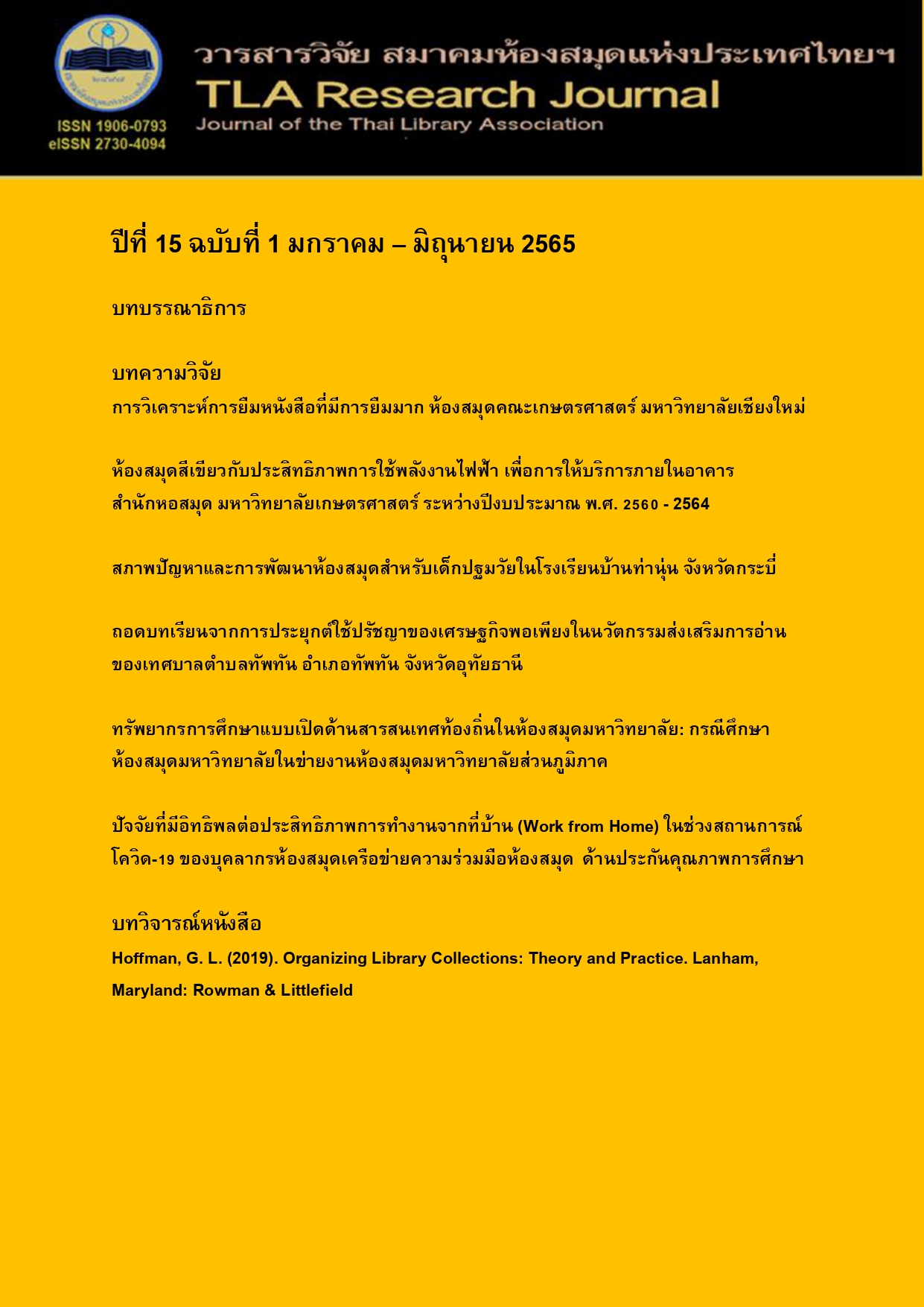Open Education Resources About Local Information in Academic Libraries A Case Study of Academic Libraries in the Provincial University Library Network
Main Article Content
Abstract
The research aimed to investigate and analyze Open Education Resources (OERs) about Local Information in twenty academic libraries in the Provincial University Library Network. It was found that only three academic libraries created OERs, mostly about local tradition and customs followed by local history. Nearly half were article/book files, followed by picture files. All of the OERs shown as web pages were developed in house, with references. All distinct image files, article/book files and video files are cataloged with standard metadata records. However, all of the OERs found did not hold to all of the 5R’s (Retain, Reuse, Revise, Remix and Redistribute), with no clear indication for revision, remixing and redistribution. Ramifications on library roles and policy considerations for greater OER adoption are discussed.
Article Details

This work is licensed under a Creative Commons Attribution-NonCommercial-NoDerivatives 4.0 International License.
บทความทุกเรื่องที่ลงตีพิมพ์จะได้รับการตรวจอ่านโดยผู้ทรงคุณวุฒิ ความคิดเห็นและบทความที่ปรากฏในวารสารนี้ เป็นของผู้เขียนซึ่งมิใช่เป็นความคิดเห็นของคณะผู้จัดทำ และมิใช่ความรับผิดชอบของสมาคมห้องสมุดแห่งประเทศไทยฯ การนำบทความในวารสารนี้ไปตีพิมพ์ซ้ำต้องได้รับอนุญาตจากคณะผู้จัดทำ
All articles submitted for publication will be reviewed by the academic reviewers. The editorial board and TLA claim no responsibility for the content or opinions expressed by the authors of individual articles or columns in this journal. Reprinting of any articles in this journal must be permitted by the editorial board.
References
Allen, N., Browne, D., Forward, M. L., Green, C., & Tarkowski, A. (2015, November 18). Foundations for OER strategy Development drafting committee. Version 1.0. Retrieved from http://www.oerstrategy.org/home/read-the-doc/index.html.
Bawack, R., & Nkolo, P. (2018). Open access movement: Reception and acceptance by academic libraries in developing countries. Library Philosophy and Practice. Retrieved from http://digitalcommons.unl.edu/libphilprac/2023.
Boufarss, M. & Laakso, M. (2020). Open Sesame? Open access priorities, incentives, and policies among higher education institutions in the United Arab Emirates. Scientometrics,124, 1553–1577. https://doi.org/10.1007/s11192-020-03529-y.
Commonwealth of Learning. (2011). A basic guide to Open Educational Resources (OER). Paris: UNESCO and the Commonwealth.
Commonwealth of Learning. (2016). Open Educational Resources: Policy, costs, transformation. Paris: UNESCO and the Commonwealth.
Creative Commons. (n.d.). What is OER?. Retrieved from https://wiki.creativecommons.org/wiki/What_is_OER%3F.
ECHER. (n.d.). European Cultural Heritage: Resource for Education. Retrieved from http://echreproject.com/.
Elias, M., Oelen, A., Tavakoli, M., Kismihok, G, & Auer, S. (2020). Quality evaluation of Open Educational Resources. In Proceedings of the 15th European Conference on Technology-Enhanced Learning (EC-TEL2020). Springer.
IFLA. (n.d.). Open Educational Resources and Libraries: A briefing. Retrieved from https://cdn.ifla.org/wp-content/uploads/files/assets/clm/news/oer_ifla_brief.pdf.
Neely, P., Tucker, J. P., & Au, A. (2016). Open Educational Resources: A review of attributes for adoption in an online bachelor’s degree program. Journal of Instructional Research, 5, 61-69.
OER Commons. (n.d.). Explore, create, collaborate. Retrieved from https://www.oercommons.org/
Open University. (n.d.). OpenLearn. Retrieved from https://www.open.edu/openlearn/?
Provincial University Library Network. (2017). 3 ทศวรรษ Pulinet สานพลังที่ยั่งยืน. [Three decades of Pulinet, sustainable coalition]. Retrieved from https://issuu.com/stoulibrary/docs/3. [in Thai].
Provincial University Library Network. (n.d.). เกี่ยวกับเรา. [About us]. Retrieved from http://www.pulinet.org/about/. [in Thai].
Provincial University Library Network. Local Information Working Group. (n.d.). ก่อเกิดความร่วมมือ. [Initiating cooperation]. Retrieved from http://www.esanpedia.oar.ubu.ac.th/localpulinet/?page_id=8. [in Thai]
Smith, B., & Lee, L. (2017). Librarians and OER: Cultivating a community of practice to be more effective advocates. Journal of Library & Information Services in Distance Learning,11(1/2), 106–123.
SPARC. (n.d.). Open education. Retrieved from https://sparcopen.org/open-education/
Sweeny, L., & Tanaka, K. (2022, March 21). Teaching with cultural heritage materials during the pandemic. Retrieved from https://doi.org/10.18665/sr.316459.
Sweet, C., & Clarage, E. C. (2020). Library consortia contributing to college affordability: Collection and OER initiatives in the Consortium of Academic and Research Libraries in Illinois. Reference Services Review,48 (3), 433-445.
Todorinova, L., & Wilkinson, Z. T. (2019). Closing the loop: Students, academic libraries, and textbook affordability. Journal of Academic Librarianship, 45(3), 268–277.
UNESCO. (n.d.). Open Educational Resources (OER). Retrieved from https://en.unesco.org/themes/building-knowledge-societies/oer.
UNESCO & Commonwealth of Learning. (2015). A Basic guide to open educational resources (OER). UNESCO. Retrieved from https://unesdoc.unesco.org/ark:/48223/pf0000215804.
William and Flora Hewlett Foundation. (2013). White paper: Open Educational Resources, Breaking the lockbox on education. Retrieved from https://hewlett.org/wp-content/uploads/2016/08/OER%20White%20Paper%20Nov%2022%202013%20Final_0.pdf.


